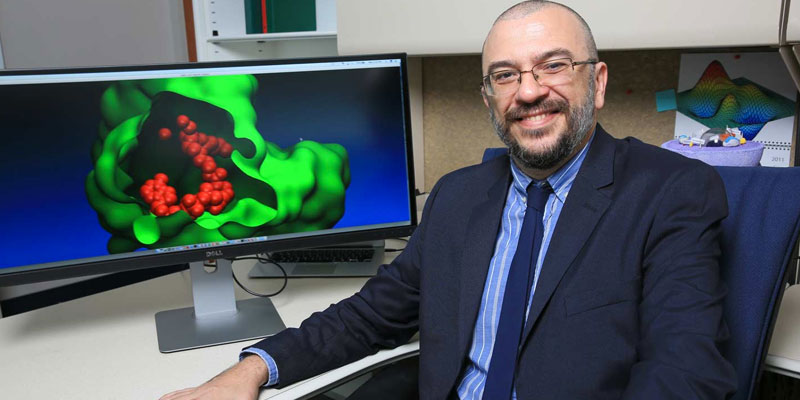HUNTSVILLE, Alabama – A researcher at the University of Alabama in Huntsville is joining an effort involving the world’s fastest supercomputer to screen compounds that could be effective against the pandemic COVID-19 virus.
Dr. Jerome Baudry, a professor in the Department of Biological Sciences at UAH, said his lab is involved in a project that is using the Oak Ridge National Laboratory’s Summit supercomputer to examine the compounds.
According to an UAH announcement, compounds under review include drugs already available with safe profiles, as well as natural products. Compounds identified as possible future drugs will also be studied.
“We are at this point focusing on repurposing existing drugs,” he says. “That is, to take existing drugs from the shelf and find which ones are active against either the virus itself or can help in treating or mitigating the effects of infection in the severe cases.”
Dr. Baudry said around 30 researchers are involved in the project, working around the clock. The group is studying how the virus ticks, including how it expresses proteins, for clues on how to combat it.
“We can use high performance computers and supercomputers to look at the entire genome of the virus, see everything the virus’ genome is making and build computational models of all these proteins, and repeat the repurposing process for each of these proteins,” Dr. Baudry said.
‘VIRTUAL TEST TUBE’
Scientists in the group are starting with some proteins on the surface of the virus in an effort to prevent it from infecting human cells.
“We are also looking at some of the proteins that allow the virus to replicate itself when it is inside the human cell in order to block this process, a bit like for many anti-AIDS drugs,” Dr. Baudry says.
“But we will expand to pretty much everything in the virus’ genome that can be targeted by a drug.”
The work of the research group is its early stages, but Summit has performed the first calculations, according to UAH. Oak Ridge National Laboratory’s 200 petaflop supercomputer allows researchers in all fields of science unprecedented access to solving some of the world’s most pressing challenge.
Researchers are beginning the effort with databases created about existing drugs, natural products or molecules that may not have been tested yet as drugs. There are thousands of them. Then they build virtual models of these compounds using the laws of physics and chemistry to calculate their composition and arrive at a very detailed computational description.
“Then we look at the virus’ genome,” Dr. Baudry said. “We have to build models for all the virus’ proteins, again describing all the atoms, their properties, how they move together, etc.”
At that stage the supercomputers step in to compute how the atoms of a possible drug will interact with the atoms of the virus’ proteins.
“It’s like doing a test tube experiment to see if a possible drug will bind to the protein, except that we perform this in a virtual test tube using our computers,” he says.
(Courtesy of Made in Alabama)
Don’t miss out! Subscribe today to have Alabama’s leading headlines delivered to your inbox.
